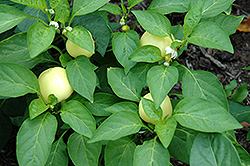
Plant Finder
Alma Paprika Pepper
Capsicum annuum 'Alma Paprika'
Height: 18 inches
Spread: 18 inches
Sunlight:
![]()
Hardiness Zone: (annual)
Other Names: Almapaprika Pepper, Hungarian Apple Pepper
Description:
This excellent variety produces loads of thick walled, rounded peppers that emerge cream then progress to orange, then red; great for drying and grinding, to be used as paprika spice, or for fresh eating
Edible Qualities
Alma Paprika Pepper is an annual vegetable plant that is commonly grown for its edible qualities, although it does have ornamental merits as well. It produces creamy white peppers (which are technically 'berries') with buttery yellow overtones which are usually ready for picking from mid summer to early fall. The fruit will often fade to gold over time. The peppers have a spicy taste and a crisp texture.
The peppers are most often used in the following ways:
- Cooking
- Drying
- Seasoning
- Sauces
Planting & Growing
Alma Paprika Pepper will grow to be about 18 inches tall at maturity, with a spread of 18 inches. This vegetable plant is an annual, which means that it will grow for one season in your garden and then die after producing a crop.
This plant can be integrated into a landscape or flower garden by creative gardeners, but is usually grown in a designated vegetable garden. It should only be grown in full sunlight. It is very adaptable to both dry and moist growing conditions, but will not tolerate any standing water. It is not particular as to soil type or pH. It is somewhat tolerant of urban pollution. This is a selected variety of a species not originally from North America, and it is considered by many to be an heirloom variety.
Alma Paprika Pepper is a good choice for the vegetable garden, but it is also well-suited for use in outdoor containers and hanging baskets. It is often used as a 'filler' in the 'spiller-thriller-filler' container combination, providing a mass of flowers and foliage against which the larger thriller plants stand out. Note that when growing plants in outdoor containers and baskets, they may require more frequent waterings than they would in the yard or garden.
